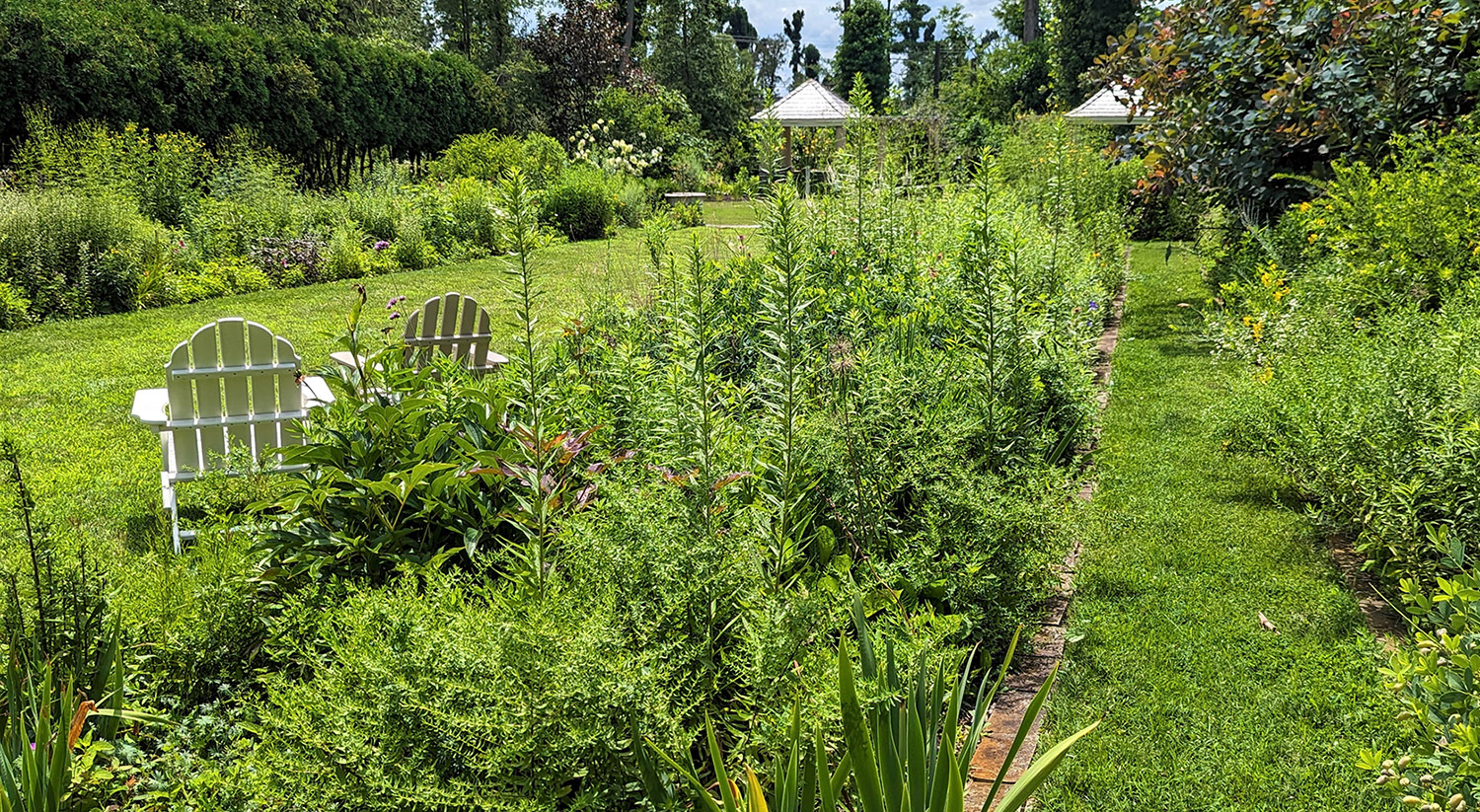How do you have an arboretum without any trees? It was a question insensitively posed to Kathy Salisbury, Director of the Ambler Arboretum of Temple University, by a visitor to campus not long after an EF2 tornado felled hundreds of trees on campus on September 1, 2021.
Salisbury, her dedicated staff, Temple Facilities Management, students, and an army of arborists and volunteers have been answering that question since September 2, 2021 — replant, regrow, recover. Read the full story about the Ambler Arboretum's recovery here.
Coupled with a vital and diverse collection of trees, plants and gardens — with hundreds of new trees planted — the Ambler Arboretum remains as it has always been, an essential location for unique hands-on learning and a place for rejuvenation and healing in nature.
As the Ambler Arboretum and Ambler Campus head toward two years since the tornado changed everything, one word has been front and center for Salisbury and her team —Stephanie Bross, Gardens Manager; Michael Hitchings, Lead Horticulturist; Anne Brennan, Plant Records Curator; Samatha McGuriman, Arboretum STEM Programs Specialist; and Drew Schoen, Horticulture Technician — Progress.
Progress is also the theme of the 2023 Ambler in Bloom, the Ambler Arboretum’s annual garden party fundraiser, which will be held in the campus gardens on Saturday, September 23, from 11 a.m. to 3 p.m. Register online at https://alumni.temple.edu/bloom.
Ambler in Bloom will feature a progressive-style brunch that will take visitors to various locations on campus to enjoy different cuisine options, live music, and silent and live auctions.
According to Salisbury, this year’s event invites visitors to “see how we’re progressing post-tornado by visiting five garden spaces and learning about our vision and plans for their future.”
“Our visitors’ journey at Ambler in Bloom will take them through the future locations of the reimagined Woodland Garden and Sustainable Wetland Gardens. They’ll also see the new areas for the planned Honor Grove, Campus Heritage Garden and the Climate Resilient Landscape,” she said. “We have engaged Donald Pell Gardens to help develop conceptual designs for five new and reimagined spaces throughout the Arboretum. While they are helping us come up with ideas for designs and programming for these spaces they are also helping us understand movement through the Arboretum and connecting the gardens in ways that make sense for our variety of users.”
Planting With Intention
The planting of new trees, shrubs, vines and more on campus hasn’t been just about replacing what was lost in the tornado, but planning for the future, a future where climate change will certainly be an important factor to consider.
“Since the tornado, we have planted more than 300 trees on campus. These trees have been selected for a variety of reasons, including replacing species lost on campus, meeting the needs of faculty, diversifying the collection and responding to predicted climate change. This is just the first small step of a larger three-year process,” said Salisbury. “We wanted to be very intentional in our tree selection. We want the Arboretum to show what a climate-resilient landscape looks like.”
Help supporting the ongoing progress in the gardens has come in the form of tree donations from a wide variety of sources, including, Morris Arboretum, Stoneleigh: A Natural Garden, Action Tank, LLC, Villanova University, Harmony Hill Nursery, Scott Arboretum, Nemours Foundation, Jeffrey Lapp, North Creek Nursery, Rick Ray, and David Brothers Nursery.
“Our botanical collections and horticultural displays are going to be more diverse and robust than before. For example, we have installed a unique cultivar that is just one of 40 known. We have installed a wide diversity of maples in collaboration with the Global Conservation Consortium of Maples,” said Salisbury. “This consortium works to create comprehensive strategies to prevent species extinctions. In our case, we are providing an additional location for species that exist in only one location now, so that if something should happen to the collection at another garden, we will still have a sample of those trees. We know firsthand what can happen to a collection in an instant.”
In addition to new plants, trees and connecting gardens, which are currently in development, visitors to the Arboretum today will see new signage throughout the gardens, restored and new spaces, such as the Vine Display Gardens created by students on the Landscape Architecture Junior Design-Build Studio, the rebuilt Bright Pavilions and a new Green Roof Garden display created by students from Upper Perkiomen High School. New sculpture created by Master of Architecture students for wildlife also dot the Arboretum and campus.
“A lot of planning went into developing the Arboretum's new signage. Phase one is complete with more than 20 garden labels and six new welcome signs going in around the gardens,” said Salisbury. “We have been working on this project for years and it is really exciting to see them go in. Phase two will be the interpretive signage that will help us tell our story and provide information for people to take home to their own gardens.”
The Collins Nursery, established by renowned landscape architect and nurseryman, John F. Collins, is also now part of the Ambler Arboretum. In 1988, Collins came to Temple Ambler to help steer the fledgling four-year Landscape Architecture and Horticulture programs (now offered by the Tyler School of Art and Architecture) as a professor and chair of the Department of Landscape Architecture and Horticulture. More information about how the Collins Nursery will be an essential part of the future of the Arboretum is coming soon.
Providing additional benefits to Ambler Arboretum members, the Ambler Arboretum became a member of the American Horticultural Society's Reciprocal Admissions Program in 2023. The program promotes horticulture across North America, encouraging people to visit gardens and other horticultural institutions.
Continue here to read the full story of the Ambler Arboretum's recovery.

